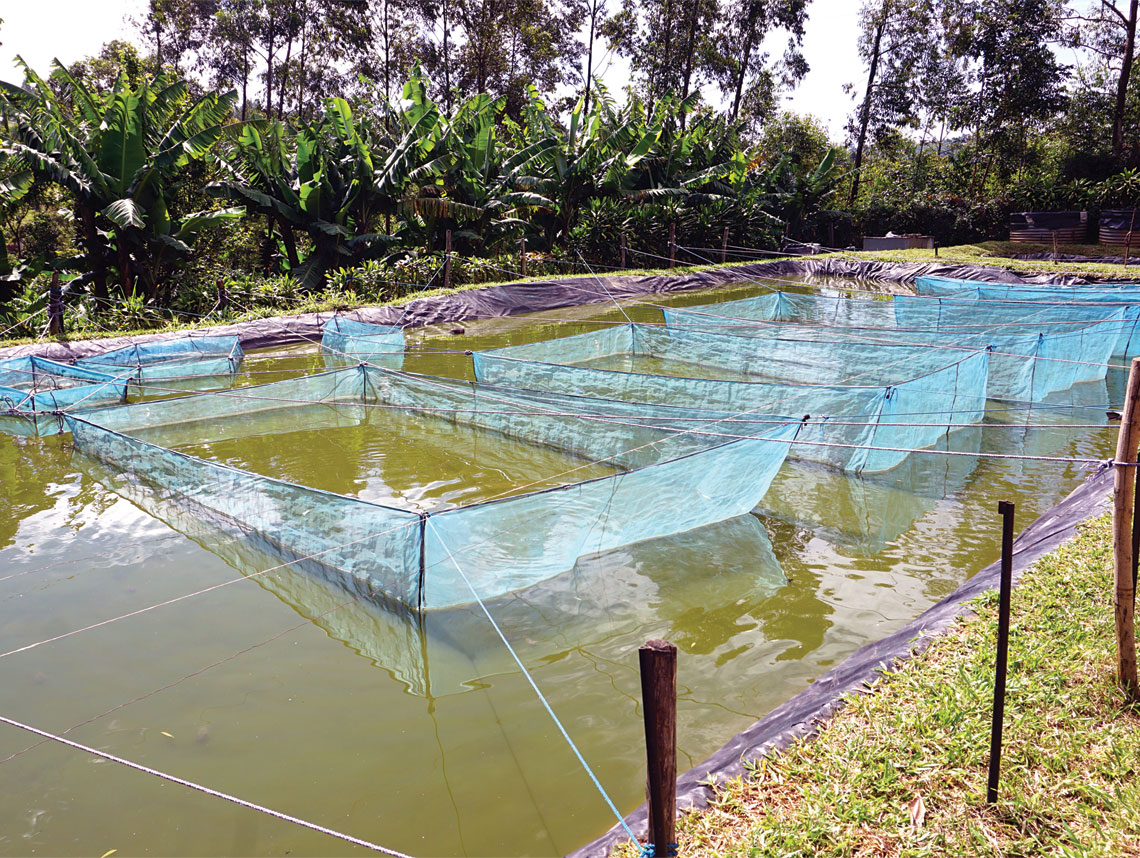 Tigoi Fish Farm in Kenya raises tilapia and catfish using fish farming techniques developed in Israel. Photo by Jacob Brauner
Tigoi Fish Farm in Kenya raises tilapia and catfish using fish farming techniques developed in Israel. Photo by Jacob Brauner Zinath Deen harvests fish in rectangular enclosures suspended in a pond on her property in Kenya, land surrounded by grassland, cattle barns and the occasional hut advertising a Kenyan mobile phone company. Kenyans perform manual labor on either side of the nearby highway.
Dressed in a kitenge, a traditional garment popular among Kenyan women, the widowed grandmother of four raises Nile tilapia and African catfish using techniques developed in Israel, which she visited last October.
Deen has transformed her property in Kisumu, Kenya’s third-largest city, into a commercial fish farm. Her local community enjoys the fruit of her harvest.
Addressing a delegation of Jewish-American leaders from Los Angeles who spent a week in Kenya last year at the invitation of Israel’s Ministry of Foreign Affairs, which oversees Israel’s Agency for International Development Cooperation, or MASHAV, Deen called Israel “wonderful.” (This reporter was part of the subsidized trip.)
Since 2012, Israel has been exporting its innovative fish farming technology to Kenya as part of an arrangement with MASHAV, the Kenyan Ministry of Fisheries Development and the German Ministry for Economic Cooperation and Development.
The countries entered into the agreement in response to dwindling fish stocks in Lake Victoria, Africa’s largest lake, which overlaps Uganda, Tanzania and Kenya, and to a rising demand for fish, all to assist commercial farmers like Deen.
The agreement also supports a longstanding partnership between Israel and Kenya as Israel seeks to nurture positive relationships with African countries in an effort to bolster its image in the international community. Israeli Prime Minister Benjamin Netanyahu visited Kenya, Ethiopia, Rwanda and Uganda last year, in part to gain allies beyond the United States and Europe.
The cooperative agreement has resulted in the training of Kenyan aquaculture farmers; the establishment of an aquaculture training unit at Kenya’s Ramogi Institute of Advanced Technologies; and the training of fish feeds and fingerling (young fish) producers.
Deen said she wants to share her skills with fellow Kenyans. To that end, she has constructed a training hall on her land that provides students from the institute with an educational facility focused on fish farming, in order to give them hands-on aquaculture experience.
Israel plays an important role in the global fish farming industry. The International Symposium on Tilapia in Aquaculture, hosted and sponsored by the Society of Israeli Aquaculture and Marine Biotechnology, was held in Jerusalem in 2013.
One Israeli company capitalizing on fish farming growth is AquaMaof Aquaculture Technologies. The company runs an experimental indoor fish farm that has raised four types of fish species, including barramundi, an Asian sea bass, in Revivim, a kibbutz in the Sinai Desert. The yields have provided fresh fish for the hospitality industry, according to the company website.
Meanwhile, one of the specialties at the Agricultural Research Organization Volcani Center, an Israeli agriculture research center near Tel Aviv, is farming fish in environments facing water shortages.
The relationship between Kenya and Israel dates back to 1963, when Kenya became independent from Great Britain. Golda Meir, then Israeli minister of foreign affairs, attended the inauguration of the Israeli embassy in Nairobi. Today, a large photograph of Yoni Netanyahu, the prime minister’s brother, who died during the 1976 raid of Entebbe, Uganda, hangs above a conference room table inside the Israeli embassy in Nairobi. Kenya served as the staging ground for the famous Israeli rescue operation.
Through MASHAV, Israel is working with Kenyans on agriculture, education and women’s issues. MASHAV, which launched in 1957, also is active in the Middle East, Asia, Central Europe, Latin America and the Caribbean.
Michael Baror, current deputy ambassador at the Israeli embassy in Nairobi, said Israel’s assistance to Kenya and other developing countries is a reflection of Jewish values.
Addressing the delegation at Tigoi Fish Farm, which included Deen and a German representative, he said, “For our world to be a better place, knowledge must not only be kept but shared.” n





















 More news and opinions than at a Shabbat dinner, right in your inbox.
More news and opinions than at a Shabbat dinner, right in your inbox.